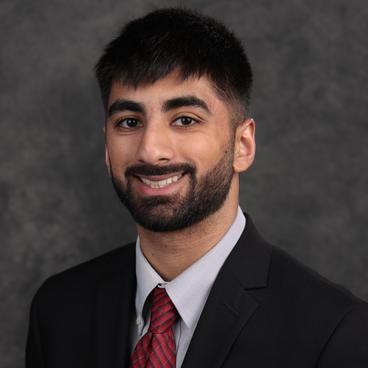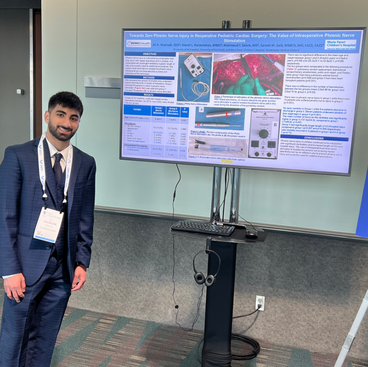
Research Advice From a Recent UMN Grad

This week, recent University of Minnesota College of Liberal Arts graduate Ali Mashadi, BA, shares about his journey as a pre-med student, his experiences getting involved in research and eventually presenting nationally, and how he brought these experiences into his medical school applications. Ali offers his advice for pre-health students who also hope to contribute to research during their undergraduate years. Find links to learn more and get involved in research at the University of Minnesota at the end of the interview!
My name is Ali Mashadi. I am a recent graduate from the University of Minnesota with a bachelor’s degree in Human Physiology and Urdu. I first want to express my gratitude to the Pre-Health Student Resource Center (PHSRC) for giving me the opportunity to share my personal experiences during my undergraduate journey. In this post, I aim to highlight my research contributions throughout my time in college and express research opportunities available to undergraduate students.
Describe your journey to pursuing medicine. Why do you want to be a doctor?
Since I was a young child, I have always had a deep interest in medicine. I recall a moment from my kindergarten days when my teachers asked each of us about our aspirations for the future. With great enthusiasm, I exclaimed that I wanted to become a doctor because I like blood! This early passion for medicine persisted as I progressed through my studies, but it was during my 11th-grade year that a significant turning point occurred in my journey toward becoming a physician.
During that time, a close family member underwent open-heart surgery to address a congenital heart defect (a heart defect present at birth). Unfortunately, he experienced severe postoperative complications, which caused his health to deteriorate with each passing day. However, through what can only be described as a miraculous recovery, he eventually was discharged from the hospital and has continued to be in good health today. It was during this challenging period that my limited understanding of the situation prompted me to delve deeper into medicine. Through my exploration, I discovered the vastness of the field and the various specialized areas that physicians can pursue.
Given the personal connection to my family member's heart condition, my interest gravitated toward a specific field: cardiac surgery. This passion has endured, and as I embark on the next chapter of my educational journey, I eagerly anticipate what the future holds.
How did you get involved in research at the University of Minnesota?
I began my research journey at the University of Minnesota during the summer before starting college as a freshman. Through the postsecondary enrollment option (PSEO) program, which I pursued during my senior year of high school at the UMN, I had the privilege of connecting with professors actively involved in research. Driven by my interest in cardiac physiology, I reached out to professors in the Department of Integrated Biology and Physiology, of which the research conducted by Dr. Dwayne Townsend, DVM, Ph.D., interested me the most. After joining his team, I delved into studying the cardiac pathophysiology associated with Duchenne Muscular Dystrophy (DMD), an X-linked recessive inheritance disorder.
From June 2019 to January 2021, I had the honor of working alongside Dr. Townsend. During this period, I gained valuable knowledge in the scientific method, conducting tasks such as immunofluorescence staining of heart tissues, microscopic quantification and analysis of cardiac ischemia, and statistical analysis of ischemia data. While I enjoyed the research I conducted, I felt a sense of disconnection. It was during the COVID-19 pandemic when I joined an online journal club that I realized this disconnect was due to my true interest in focusing on patient-centered research models. This realization led me to explore the realm of clinical/outcomes research, which aligned more closely with my passion.
Motivated by this revelation, I reached out to Dr. Sameh Said, MD, a congenital cardiac surgeon with expertise in treating both pediatric and adult patients, who was actively involved in extensive clinical/outcomes research at the UMN. In January 2021, I became a research fellow in his team, and I have been collaborating with him ever since. In my current role, I am responsible for selecting research topics, conducting comprehensive chart reviews of patients relevant to the chosen topics, analyzing collected data, and preparing manuscripts for publication. Additionally, I have had the opportunity to create educational surgical videos that have been presented at conferences and published on multimedia platforms. I am sincerely grateful for the diverse opportunities that this position has provided me, and I aspire to continue conducting clinical/outcomes research in my future career.
You presented your research nationally! Tell us about that experience?

I had the fortunate opportunity to present my research at the 103rd Annual Meeting of the American Association of Thoracic Surgery in Los Angeles, California this May 2023. The title of my presentation was "Towards Zero Phrenic Nerve Injury in Reoperative Pediatric Cardiac Surgery: The Value of Intraoperative Phrenic Nerve Stimulation." Attending this conference was an incredible experience that enriched my knowledge and passion for medicine, particularly in the field of cardiothoracic surgery. Interacting with the leading experts in the field and learning about their current research advancements further fueled my passion for the field.
Among the many memorable experiences at the conference, one that stands out was the privilege of talking to Sir Magdi Yacoub, a British-Egyptian surgeon and one of the pioneers of the Ross procedure for treating aortic valve disease. His groundbreaking work, along with ongoing studies by himself and others, showcased the potential application of this procedure across all age groups.
Since then, I have been fortunate to have my work accepted for other national and international conferences, and I eagerly look forward to presenting my research at these upcoming events.
Looking back, how did your research experience influence your perspective on medicine, and your motivation to be a doctor?
My research experience has undoubtedly transformed my perspective on medicine and shaped my motivations for my future medical career. Initially, I entered university with the intention of pursuing a career as solely a clinician. However, through my involvement in research, a strong desire has emerged within me to pursue an academic medical career. This entails being a clinician who incorporates research into the practice of medicine to provide the best possible care for my patients.
Medicine is a dynamic field that thrives on continuous advancements, whether they be in technology or other facets. It is crucial for healthcare professionals to stay at the forefront of these developments in order to deliver optimal patient care. This realization has fueled my passion for combining clinical practice with ongoing research, allowing me to contribute to the constant evolution of the field.
How did your research experience come up in your medical school applications?
I have recently submitted my application for medical school in the upcoming cycle, and I have come to recognize the significance of research experience in shaping one's application. While a dual MD and Ph.D. program may be an appealing choice for those interested in establishing their own research labs, individuals like myself have found that research experience can significantly influence their journey towards medicine and their participation in other extracurricular activities during their undergraduate years.
One noteworthy example was my involvement as a founding member of a campus group called Multipotentialites in Medicine (MinM's). This group was established in September 2020, coinciding with my newfound interest in clinical/outcomes research. In my application, I highlighted my research experiences and how they contributed to my motivation for starting the group. This allowed me to provide a comprehensive picture of my aspirations and desires.
What advice do you have for undergraduates looking to gain research experience?
Based on my research experience, the most valuable advice I can offer to undergraduates seeking research opportunities is to find mentors who foster growth and prioritize teaching. I have been fortunate to work with two exceptional mentors who have encouraged me to ask questions and truly understand the subject matter. I firmly believe that every undergraduate, regardless of their starting point, has the potential to become an expert in their chosen field of study. However, this capacity can only be realized through effective mentorship.
In addition to finding the right mentors, possessing an intrinsic drive to learn and the ability to persevere during challenging times are key differentiating factors for success in research. When coupling the aforementioned mentorship with these factors, the possibilities are endless.
Anything else you'd like to share with UMN pre-health students?
I would like to extend my heartfelt gratitude to the Pre-Health Student Resource Center (PHSRC) for giving me the opportunity to share my thoughts and experiences with all of you in this post. My intention in sharing my journey was to provide valuable insights into the diverse range of research opportunities available to undergraduate students, whether at the University of Minnesota or any other institution. If any of you have questions or would like to delve deeper into my experiences, please do not hesitate to reach out to me. I firmly believe that knowledge holds its true value when it benefits more than just the individual who initially possesses it.
Once again, I express my appreciation for this platform, and I hope that my words have inspired and enlightened aspiring researchers and students alike.
Thank you Ali for sharing your experiences and insights with PHSRC Pulse readers!
Looking to dive into research opportunities at the University of Minnesota? Check out our page on research, or head over to the UMN Office of Undergraduate Research website to learn how to find a mentor, explore research programs, and sign up for peer drop-in hours.